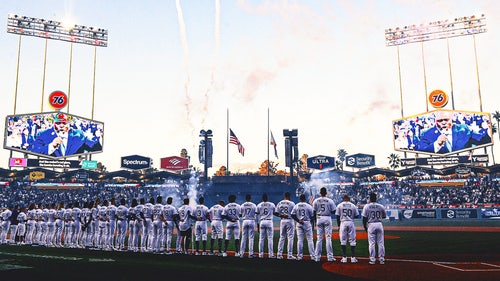
Time to go to school on passion, joy of World Baseball Classic

MIAMI – It’s not a writer’s place to tell fans or players how to act. The opinion, “American fans should act more like Dominicans,” is as presumptuous as the opinion, “Dominican players should act like more Americans.” Presumptuous, and entirely inappropriate.
The cultures are not only distinct from each other, but also distinct from the others in the World Baseball Classic. That’s the beauty of the event, really – the difference in approaches, the difference in emotions, the differences, period. We should celebrate those differences, not wish for dull uniformity.
That said, I just reveled in the electric vibe of the first round of the tournament at Marlins Park - a vibe that emanated largely from the fans and players from the Latin participants, the Dominican Republic and Colombia.
Like many of my fellow writers, I wish such passion was more frequently on display at major-league parks, though I doubt many of us would survive 162 games at that volume and at that pace.
Generalizations are tricky, sweeping conclusions trickier. But there is one word that perhaps best describes what we’re missing, and even here I might be applying too broad a stroke.
The word is joy.
Too often we forget - as we crunch numbers, dwell upon every player’s flaw and critique every manager’s last move - that the game is supposed to be fun.

Make no mistake, the Dominican fans are as obsessive as we are, if not more so. Right fielder Nelson Cruz said Sunday the biggest moments for the D.R. from the past two days would become “like legend” back home, then added with a smile, “The whole country knows about baseball. They’re experts about where to play in the lineup, who should bunt . . .”
Yet, the Dominican fans also bask in the pleasures of watching their heroes play a little boy’s game, jumping, dancing and singing during winter-ball games in their native country as well as international affairs abroad.
If, say, Twins fans started acting that way, it would seem forced, phony. But perhaps more teams could adopt promotions similar to the “King’s Court” for Felix Hernandez’s starts in Seattle, when fans dress in yellow shirts and hold “K” signs for every strikeout.
Many clubs are incapable of finding the sweet spot for such campaigns, stumbling into tackiness. But if spontaneous celebration is elusive – some teams, in this age of limited attention spans, actually feel the need to remind fans of when there are two strikes – a few clever ideas might inject more life into major-league parks.

For the players, too, it’s a fine line.
The emotions of the D.R.-U.S. and D.R.-Colombia games would be impossible for players to replicate in the major-league season, the length of which requires a more even keel.
Most foreign players also take far more pride in playing for their countries than playing for the major-league clubs that employ them, for reasons that are understandable. Many wish to stay in touch with their humble roots, and the U.S. is not their original home.
The passion of these players is pure. But in celebrating that passion, let’s not dump on the longstanding ethic of many North American players, which is perhaps best summed up by the phrase, “Act like you’ve been there.”
Hall of Famers such as Cal Ripken and Derek Jeter were revered for that ethic, the steadiness in their day-to-day approaches. Most players, regardless of their race or nationality, adhere to the don’t-get-too-high-or-low doctrine. As such, stars such as Mike Trout often come off as too bland. But over 162 games, a consistency of demeanor generally serves players well.
Which isn’t to say players always should be stone-faced, as if programmed like robots. Passion is compelling. Passion is entertaining. And for all the criticism of the so-called “unwritten rules” about player behavior in recent years, we’ve seen increasingly more emotion on the field – and the game is better for it.
Are there some who cross the line and embarrass opponents, if unwittingly? Yes, and it’s appropriate for such behavior to be condemned, though not at the extreme of throwing at the heads of the perpetrators or committing other violent acts. Freedom of expression is a central part of American culture, and we should remember that when judging a Bryce Harper or Jose Bautista. Of course, such freedom doesn’t mean you run around at work, flipping off whomever you want.
Again, it’s a fine line; one man’s celebration is another’s affront. For me, Bautista’s bat flip in the 2015 playoffs was a spur-of-the-moment reaction that was not meant to offend; some Texas Rangers and others around the sport saw it differently.
Tradition is both baseball’s biggest advantage and greatest burden; players routinely celebrate big plays in football and basketball, and hardly anyone blinks. Maybe the lesson of the WBC is that we need to recalibrate our standards, for fan behavior, for player behavior, for the way we view the sport.
Less judging. More acceptance. More joy.










